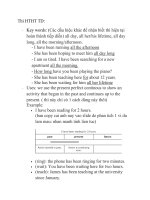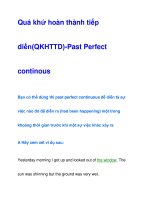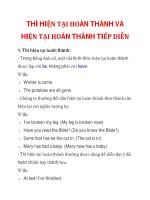QUÁ KHỨ HOÀN THÀNH/QUÁ KHỨ HOÀN THÀNH TIẾP DIỄN ppt
Bạn đang xem bản rút gọn của tài liệu. Xem và tải ngay bản đầy đủ của tài liệu tại đây (101.14 KB, 8 trang )
QUÁ KHỨ HOÀN THÀNH/QUÁ
KHỨ HOÀN THÀNH TIẾP DIỄN
THÌ QUÁ KHỨ HOÀN THÀNH
Thì quá khứ hoàn thành diễn tả
1 hành động đã xảy ra và kết
thúc trong quá khứ trước 1 h
ành
động khác cũng xảy ra và kết
thúc trong quá khứ.
CHỦ TỪ + HAD + QUÁ KHỨ
PHÂN TỪ
I had just finished watering the
lawn when it began to rain.
She had studied English before
she came to the U.S.
After he had eaten breakfast, he
went to school.
THÌ QUÁ KHỨ HOÀN THÀNH TIẾP DIỄN
Cụm và từ ngữ chỉ thời gian:
Until then, by the time, prior to
that time, before, after
We had been living in Santa Ana
for 2 years before we moved to
Garden Grove.
Dùng thì quá khứ hoàn thành
cho hành động thứ nhất. Dùng
thì quá khứ cho hành động thứ
hai.
Mẹo: Quí vị có thể nhớ theo
cách này.
Chữ cái tiếng Anh A
B C
"A" đứng vị trí thứ nhất và "A" là
chữ cái đầu tiên của chữ
"After". Cho nên After + hành
động thứ nhất.
Trước tiên: Alex had gone to
bed.
Sau đó': He couldn't sleep.
After Alex had gone to bed, he
couldn't sleep.
Trước tiên:
Jessica had cooked
dinner.
Sau đó': Her boyfriend came.
Jessica's boyfriend came after
she had cooked dinner.
"B" đứng ở vị trí thứ hai, và "B"
là chữ cái đầu tiên của chữ
"Before". Cho nên Before +
hành động thứ 2.
Trước tiên: Kimberly had taken
the test.
Sau đó': She went home
yesterday.
Kimberly had taken the test
before she went home
yesterday.
Trước tiên: Brandon had
brushed his teeth.
Sau đó': He went to bed.
Before Brandon went to bed, he
had brushed his teeth.
PAST PERFECT CONTINUOUS
TÓM TẮT:
Ðể diễn tả một hành động kéo dài, ÐÃ CHẤM DỨT ở một thời
diểm trong quá khứ.
Không có Past perfect progressive cho "To be". "Had been Being"
được diễn tả bằng "Had been" .
***
THE PAST PERFECT CONTINUOUS TENSE indicates a
continuous action that was completed at some point in the past.
This tense is formed with the modal "HAD" plus "BEEN," plus the
present participle of the verb (with an -ing ending):
"I had been working in the garden all morning. George had been
painting his house for weeks, but he finally gave up."
I hadn't been going
You hadn't been going
He hadn't been going
We hadn't been going
You hadn't been going
They hadn't been going
To say how long st had been happening before something else
happened
It had been raining (the sun was shining and the ground was wet
it had stopped raining. )
I was very tired when I arrived home , I had been working hard all
day
He was out of breath . He had been running
The house was quiet when I got home. Everybody had gone to
bed.
Tom wasn't there when I arrived : he had just gone out
The man was a complete st ranger to me . I had never seen
before.
Bill no longer had his car: he had sold it
NOTE:
There is no past perfect progressive for the "to be" verb. "Had
been being" is expressed simply as "had been":
"We had been successful before, but we somehow lost our
knack."









